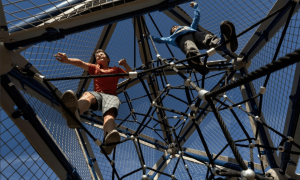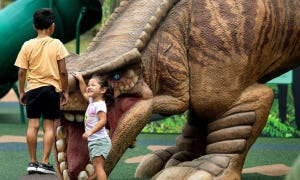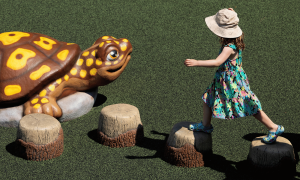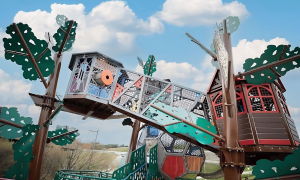Helping children stay physically active is essential to promoting healthy habits that last a lifetime. When you can make physical activity fun, kids are more likely to participate. That's where outdoor obstacle courses come in.
Parks, schools, and other youth organizations install GameTime Challenge Course outdoor obstacle courses to make exercise fun for kids and the whole family. Read on to learn how outdoor obstacle courses and childhood development go hand in hand and how time spent on an obstacle course can help children avoid future obstacles to good health.

1. Strength and Balance
When children encounter obstacles in an obstacle course, they develop and enhance strength and balance. Outdoor obstacle courses like Challenge Course are a great way for kids to get a full-body workout. It makes them stronger and enhances their sense of balance at a young age.
The strength and balance skills developed on an obstacle course transfer effectively to other sports like soccer or gymnastics.
2. Memory and Problem Solving
In life and school, kids need to be able to remember lots of information. They also need to learn how to solve problems based on sequencing information and actions. By running an outdoor obstacle course, children develop and enhance these skills.
Outdoor obstacle courses help children solve problems as they learn how to maneuver up, over, or through obstacles. They also learn how to adjust to changing conditions and memorize the fastest way to progress through the course. These skills will help them throughout their life.
3. Sensory Processing
GameTime designs a lot of outdoor playground equipment to help children learn and experience different sensory inputs. An obstacle course is also a great opportunity for children to develop sensory processing skills.
For example, kids experience deep pressure sensory input (also known as proprioception) as they pull themselves up a climbing wall. They also encounter linear (up and down), sagittal (side to side), and rotary (spinning) inputs as they run through the obstacle course. Learning these senses and how to adjust to them helps them develop motor skills, coordination, and adaptation.
4. Motor Skills
Fine and gross motor skill development is essential during childhood development. Fine motor skills help children learn how to hold a pencil or grip small objects. Gross motor skills help children walk, run, jump, and climb. Outdoor obstacle courses are the perfect environment for children to learn and enhance these vital motor skills that will benefit them for a lifetime.
5. Coordination
Sometimes called bilateral coordination, this is a skill children struggle with at an early age. Complex coordination involves moving separate body parts at the same time to complete a task. Think about the many muscle groups and body parts required to climb over a wall or weave through an agility obstacle.
An outdoor obstacle course provides a lot of opportunities for children to develop complex bilateral coordination. Developing these coordination skills improves overall health and fitness and helps kids for years to come.
Challenge Your Kids
There are so many benefits of obstacle courses in early childhood, the teenage years, and beyond. From enhancing muscle strength and motor skills to improving memory and decision-making, courses like Challenge Course can make a positive and lasting impact on children of all ages.
Ready to challenge your kids to be their best? Get in touch with a GameTime obstacle course expert and plan the perfect course for your community!
- Trails (27)
- Schools (191)
- Press Releases (109)
- Playground Funding (5)
- Play Science & Research (62)
- Parks & Recreation (360)
- Outdoor Fitness (138)
- National Demonstration Site (32)
- Landscape Architects (77)
- Inclusive Play (109)
- Daycare and Early Learning (62)
- Custom Play (38)
- College Campus (28)
- Churches (51)
- Challenge Course (30)
- Featured Projects (77)
- BluePrint for Play (18)
- Site and Shade (9)





